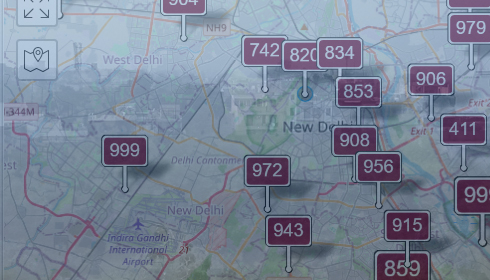
Hazardous Air Quality in New Delhi Prompts SC to Consider GRAP IV Extension
As the national capital grapples with disturbingly high air quality index (AQI) readings, the Supreme Court of India has intervened, emphasising the importance of strict pollution control measures. The court emphasised the gravity of the situation on Monday by proposing to maintain the Graded Response Action Plan IV (GRAP IV) even if AQI values improve marginally.
On Monday, the city's air quality index (AQI) reached catastrophic levels, with many monitoring stations reporting readings well above 300, a level considered detrimental to health. Analysis from several places reveals that AQI readings frequently surpass 800-900, with certain areas, such as those around Noida, achieving the highest possible result of 999. The central and southern portions of New Delhi, notably Rohini (848), and South Delhi (956), indicate the extent and severity of the pollution situation.
The situation is grave, with locations such as Ghaziabad (979) reporting extraordinarily high AQI levels. Only a few areas reported slightly lower but dangerously high levels, ranging from 411 to 461. Hazardous air covers most of the city, posing serious health hazards, especially to vulnerable groups like children, the elderly, and those with pre-existing respiratory or cardiovascular illnesses.
In reaction to deteriorating air quality, the Supreme Court has stated that it will strictly implement GRAP IV, even if the AQI falls below 300. When the AQI exceeds 450, the Supreme Court often implements GRAP IV measures, leading to extreme restrictions like complete bans on building activities, school closures, and the installation of an odd-even vehicle system to limit traffic emissions.
Justices AS Oka and AG Masih, who chaired the Bench, stated, "We are making it very clear that you will not go below stage 4 without our permission, even if the AQI falls below 300." That is the sequence we're recommending." The directive underscores the court's dedication to continuous action until we achieve significant and lasting improvements in air quality.
The present GRAP IV enforcement restricts truck admission into Delhi, except for those transporting critical supplies or delivering necessary services. However, we grant admission to cars powered by LNG, CNG, electric power, or BS-VI diesel. This tailored approach tries to reduce pollutant levels while maintaining key supply lines.
Health experts warn that prolonged exposure to such high amounts of pollution can cause serious respiratory and cardiovascular problems. The authorities have issued immediate public health recommendations, advising citizens to minimize outdoor activities, wear N95 masks, and refrain from intense outdoor activities. Authorities have also urged for improved monitoring and the execution of emergency pollution control measures, such as installing water sprinklers and halting industrial emissions in key zones.
The Supreme Court's observation underline the critical need to address New Delhi's air quality crisis. With dangerous AQI levels persisting throughout the city, continuous and strong action by both the government and individuals is critical to mitigating serious health risks and preventing the future worsening of air quality.